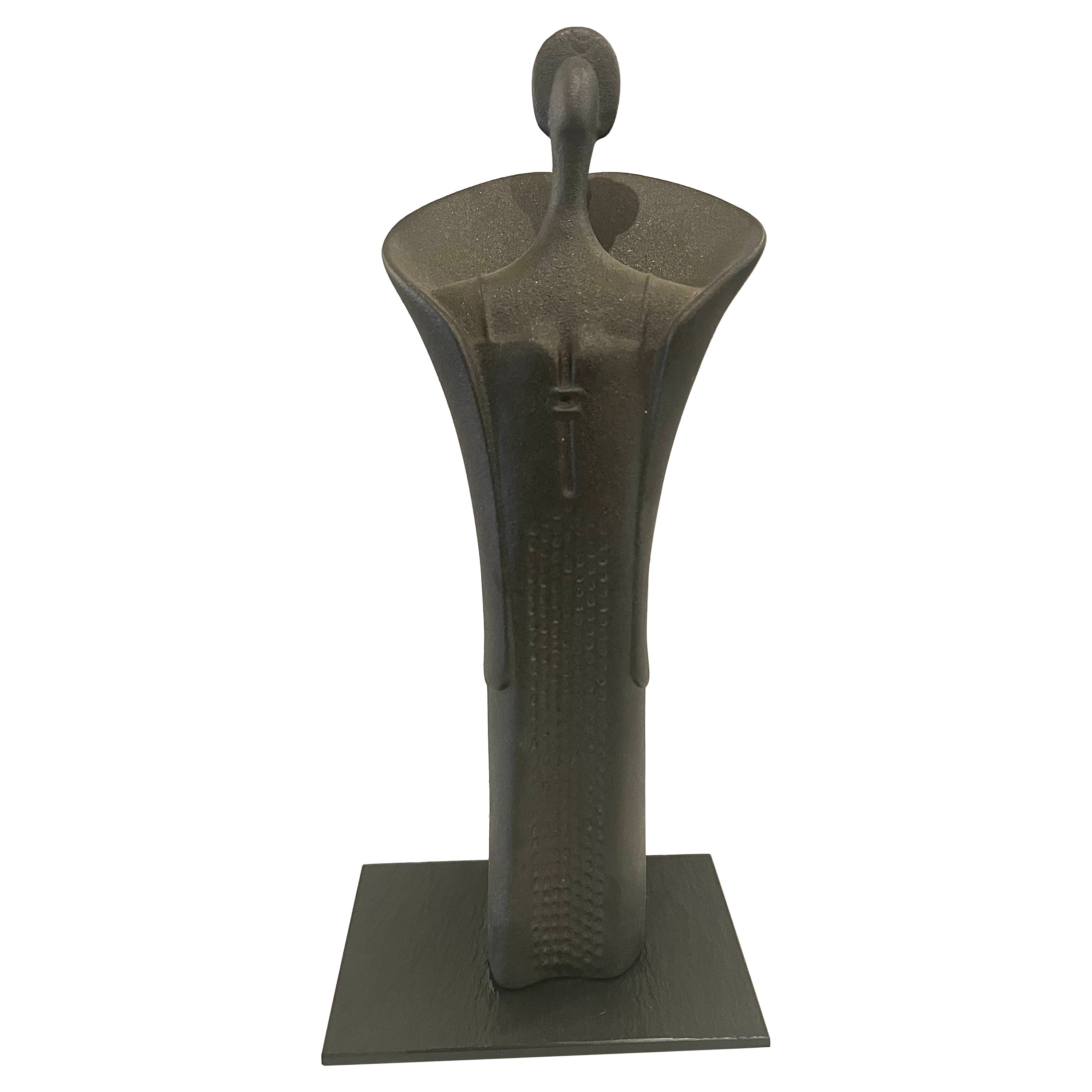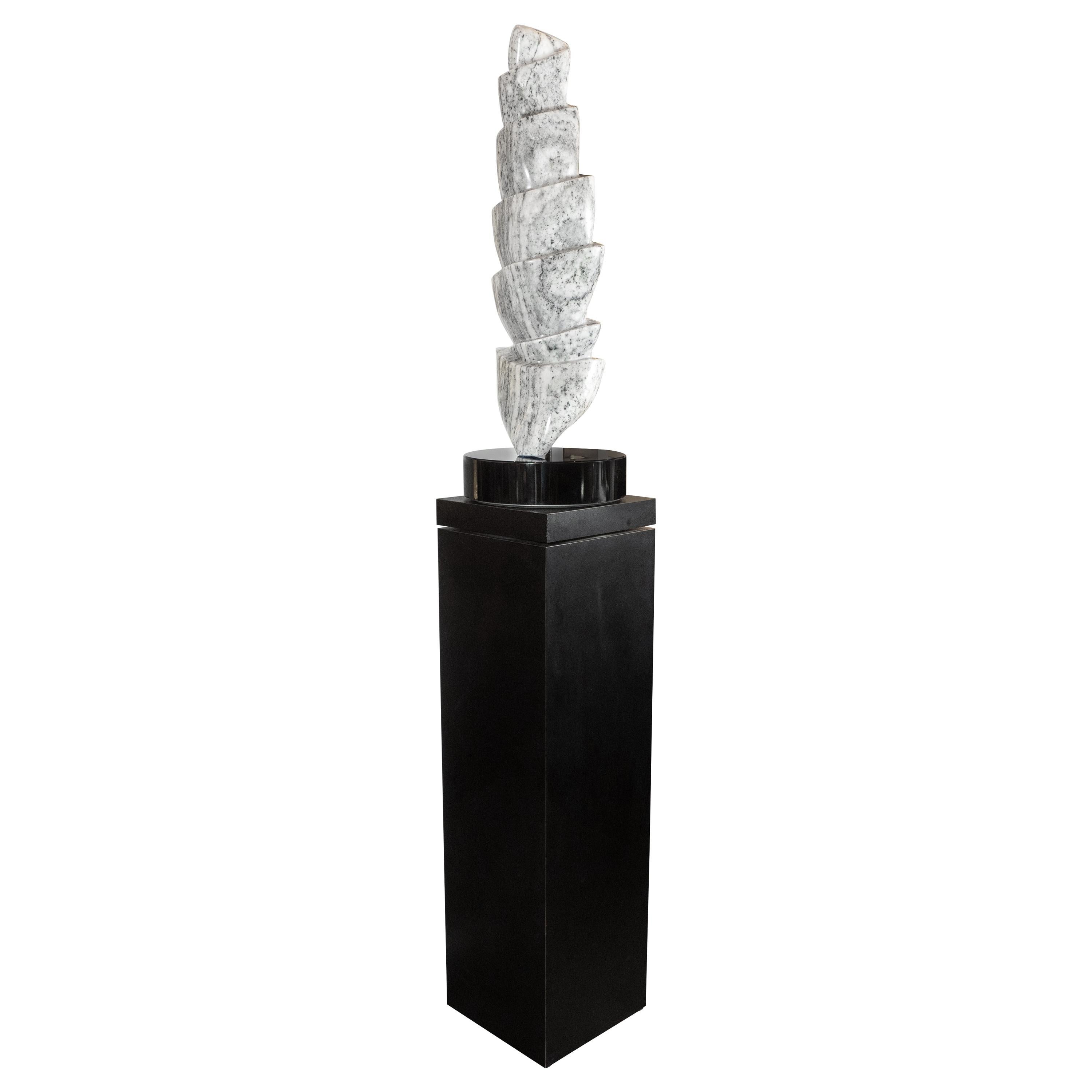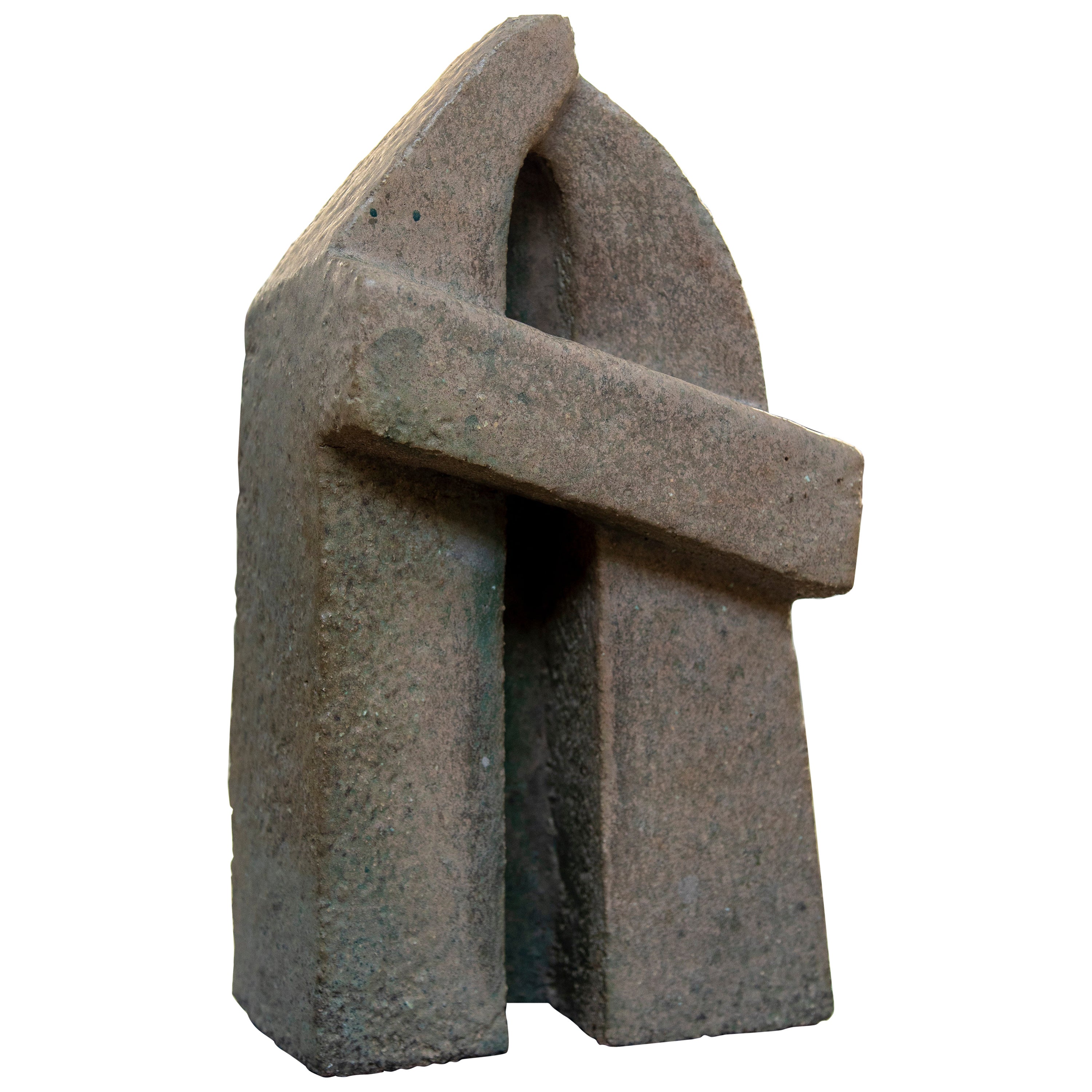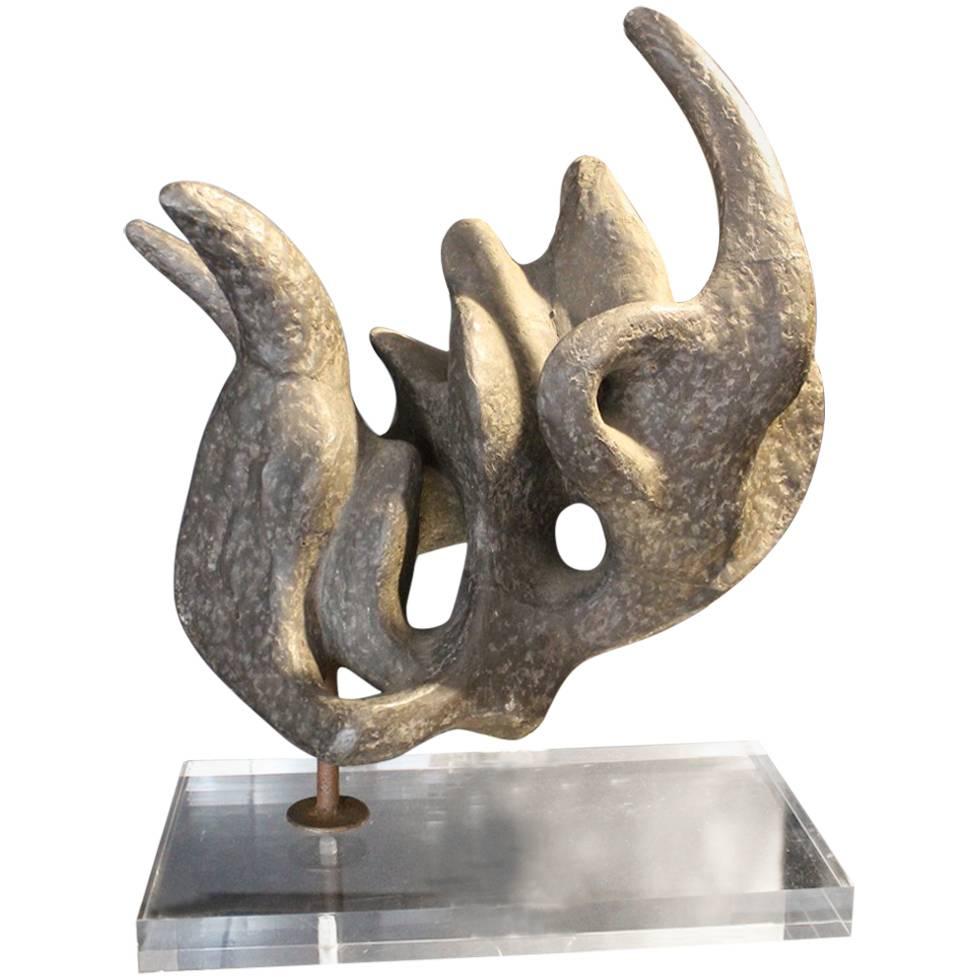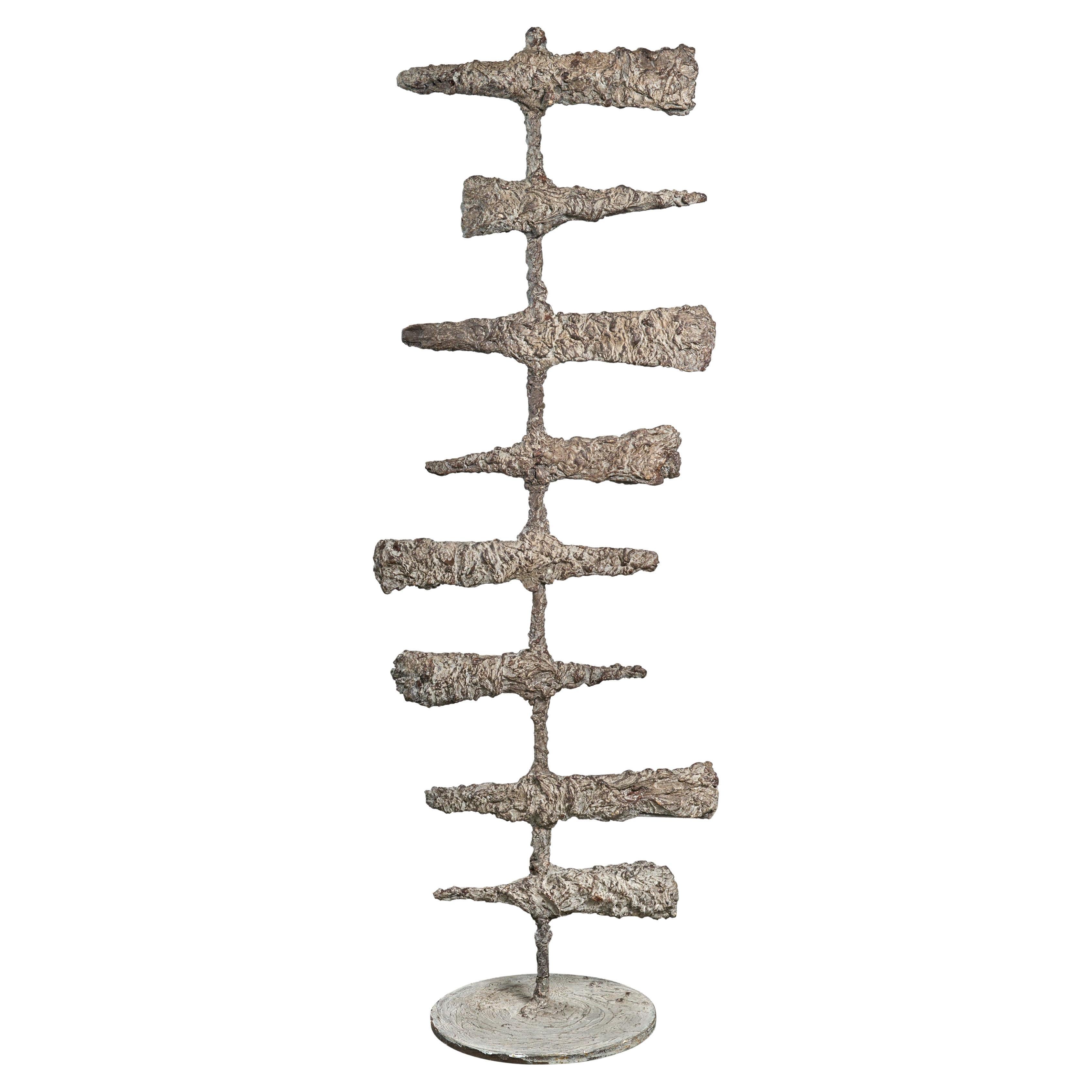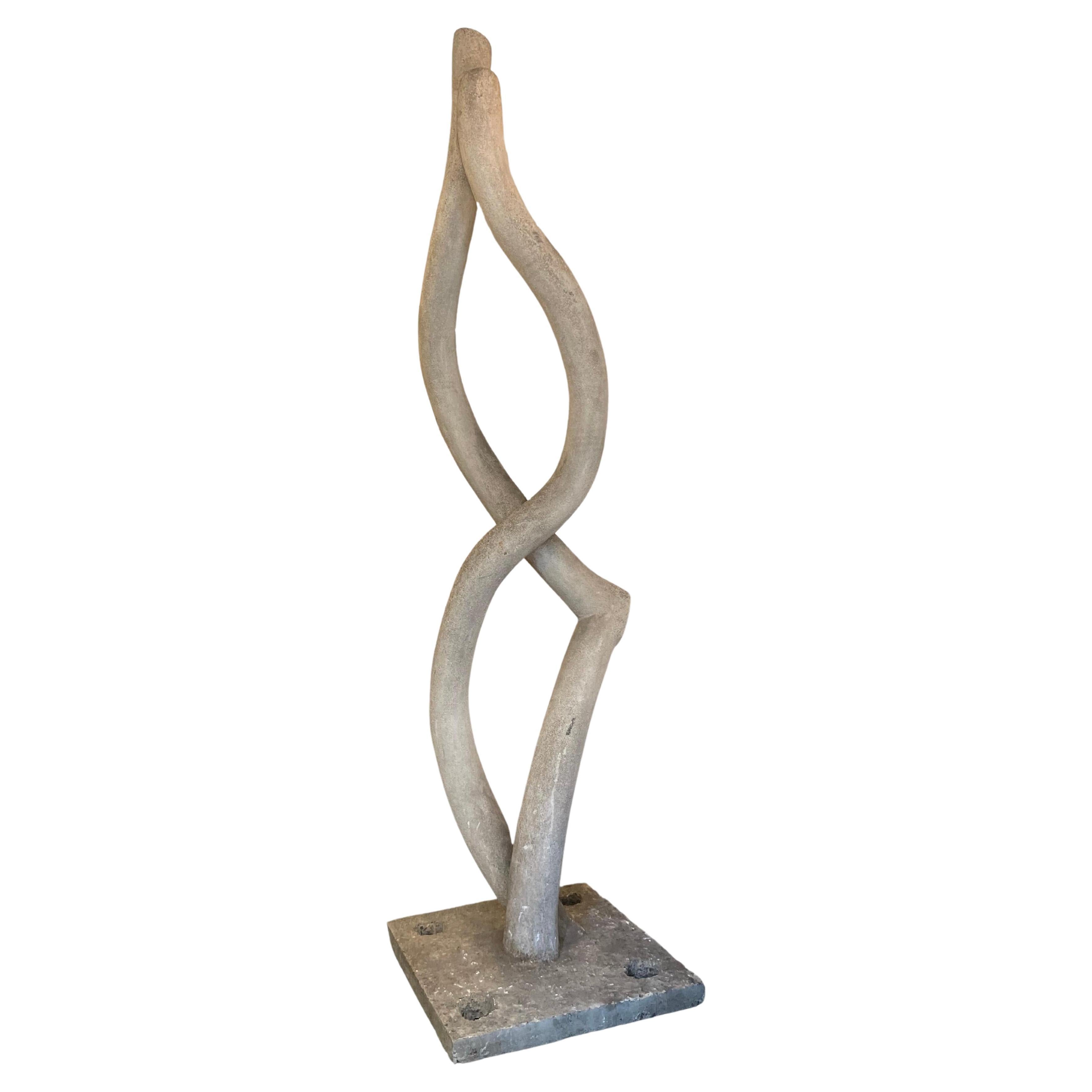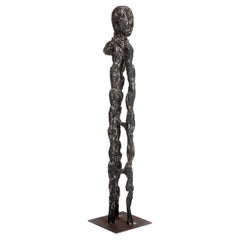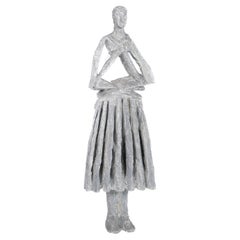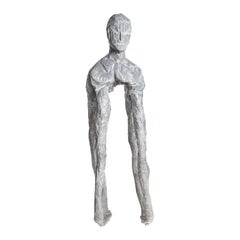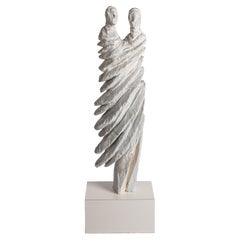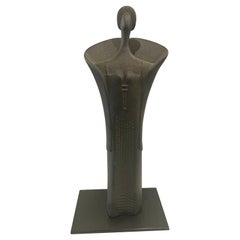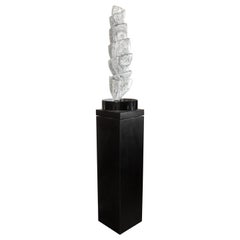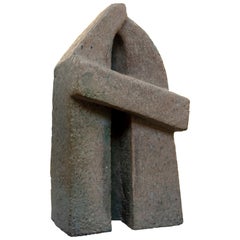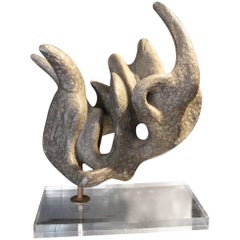Items Similar to Stoneware Sculpture on Steel Base with Glaze in Grey-White-Black, signed ZAULI
Want more images or videos?
Request additional images or videos from the seller
1 of 19
Stoneware Sculpture on Steel Base with Glaze in Grey-White-Black, signed ZAULI
$9,938.06
£7,554.59
€8,400
CA$13,966.45
A$15,188.84
CHF 8,001.82
MX$184,471.28
NOK 100,599.02
SEK 94,303.45
DKK 64,326.09
About the Item
Abstract, turned stoneware sculpture on a steel base with iridescent glaze in grey-white-black.
Lively object with different structures and glazes, signed Zauli
Carlo Zauli was born in Fenza in 1926 and died there in 2002.
1937-1948 technical and artistic training at the Institut Statale d'arte per la ceramica in Faenza. Since 1950 own studio in Faenza, since 1975 second studio in Milan. 1958-1978 Teaching at the Institut Statale d'Arte per la ceramica in Faenza. 1970 Member of the AIC Geneva. From 1973 teaching throughout Europe, including Germany, Spain, Canada and Japan.
1979 Collaboration with Rosenthal, Selb Germany.
1980-1984 Director of the Institut Superiore Industrie Artistiche in Faenza.
Vessels, vessel objects, later mainly sculpture in majolica, stoneware and porcelain - initially turned vases and vessels, through moulded vessel shapes and adaptations of turned moulds to the development of sculptures.
Objects such as wavy stripes, joined and moving forms and steles, also in large formats with characteristic monochrome but changing white glass, use of metal overlays, since 1973 works in bronze and marble, large-scale wall designs, works in public spaces.
Carlo Zauli is indisputably considered one of the most important sculptural ceramists of the 20th century.
After winning the main awards dedicated to ceramic art in the 1950s, the early 1960s saw him evolve towards a markedly sculptural interpretation of his craft. In these years he matured his own artistic language, imbued with informal atmospheres intertwined with a harmonious yet disruptive 'naturalness': these were the years of his growing international success. From 1958, the year in which the large high-reliefs for the palace in Baghdad and the Kuwait State Printing House were realised, he saw his fame grow steadily, until, in the 1970s and 1980s, he travelled throughout Europe, Japan and North America, where he realised expositions and places works permanently.
Carlo Zauli was born in 1926 in Faenza, where he passed away in 2002.
His works have changed over time:
About a vase (from 1950 to 1967)
The vase, the archetype of every ceramist, is at the centre of the research of Carlo Zauli's early period. After leaving the Art Institute in Faenza, he immediately dedicated himself to contemporary production, innovating techniques, shapes and decorative choices within a few years.
Natural vibrations (from 1967 to 1993)
At the end of the 1960s, Carlo Zauli deepened his most accomplished research, starting from primary forms furrowed by the vitalistic and material tremor that became the centre of his artistic career. The geometric solids seem to naturalise and pervade with intense sensuality thanks to endogenous movements that reveal themselves on gently moving and sinuous surfaces. The perennially fragile balance between these formal opposites becomes the key to the strong interest in Zauli's work on the part of distant cultures, especially the Japanese, in whose philosophical dialogue between ying and yang, by his own admission, the artist perfectly recognises himself. This dynamism, continually reshaped in the years to follow, sometimes goes so far as to lacerate these forms, allowing their rough inner material to be glimpsed and unleashed.
Geometric research (from 1966 to 1987)
It is through research in the field of ceramics in industrial design and the creation of increasingly regular and perfect vases that Carlo Zauli deepens his distinctly geometric sculptural research. From the high reliefs of 1966 to the sculptures of the late 1980s, geometry continuously becomes the main theme linking the artist to his own material sensitivity.
The Distorted (1976 to 1987)
Even after reaching full sculptural maturity, Zauli does not abandon the first object of observation – the vase – breaking it, tearing it, turning it upside down, and including it in the same metamorphosis of his primary geometric shapes. Thus came to be, in 1976, the Distorted Vases, torn or bent by a violent gesture, and in 1987 the Distorted Sensualities, vases that close up to become modules for a final, dramatic sculptural evolution of the artist.
The clods (from 1972 to 1987)
It is especially when Zauli deals with the theme of the clods (of clay) that he explicitly conveys the intimate symbiosis of his work with the earth. Earth, thus, is considered both a sensitive material and the starting point for all ceramic and non-ceramic works, as well as an actual geographical root. Works such as le Arate (the ploughs) or le Zolle (the clods), are created with an assembly of real clods of clay taken from the mixer and directly applied to geometric supports. Through their irregular morphology, they express the primordial strength and rough consistency of the material.
- Creator:Carlo Zauli (Sculptor)
- Dimensions:Height: 17.72 in (45 cm)Width: 4.93 in (12.5 cm)Depth: 4.93 in (12.5 cm)
- Style:Mid-Century Modern (Of the Period)
- Materials and Techniques:
- Place of Origin:
- Period:
- Date of Manufacture:1975
- Condition:
- Seller Location:Salzburg, AT
- Reference Number:1stDibs: LU2438344536052

About the Seller
5.0
Gold Seller
Premium sellers maintaining a 4.3+ rating and 24-hour response times
Established in 2000
1stDibs seller since 2016
95 sales on 1stDibs
Typical response time: 3 hours
- ShippingRetrieving quote...Shipping from: Salzburg, Austria
- Return Policy
Authenticity Guarantee
In the unlikely event there’s an issue with an item’s authenticity, contact us within 1 year for a full refund. DetailsMoney-Back Guarantee
If your item is not as described, is damaged in transit, or does not arrive, contact us within 7 days for a full refund. Details24-Hour Cancellation
You have a 24-hour grace period in which to reconsider your purchase, with no questions asked.Vetted Professional Sellers
Our world-class sellers must adhere to strict standards for service and quality, maintaining the integrity of our listings.Price-Match Guarantee
If you find that a seller listed the same item for a lower price elsewhere, we’ll match it.Trusted Global Delivery
Our best-in-class carrier network provides specialized shipping options worldwide, including custom delivery.More From This Seller
View AllContemporary Wooden Sculpture Painted Black/Grey/Off-White by Christofer Kochs
By Christofer Kochs
Located in Salzburg, AT
Contemporary wooden life-size sculpture created by circular sawing, black-grey-off-white painted on white-stuff.
Signed Christofer Kochs, 2009.
Measures: Iron base 40 x 40 cm
The obj...
Category
Early 2000s German Modern Figurative Sculptures
Materials
Wood, Paint
Abstract Wooden Grey-White Sculpture “Free to Turn" by Christofer Kochs 2016
By Christofer Kochs
Located in Salzburg, AT
Contemporary abstract wooden sculpture “Free to Turn", made by using circular saws, painted light grey
on a white background. Signed Christofer Kochs, 2015
The figure depicts a gir...
Category
2010s German Modern Figurative Sculptures
Materials
Wood, Paint
Abstract Wooden Sculpture "Chimera" Painted Grey-White by Christofer Kochs 2017
By Christofer Kochs
Located in Salzburg, AT
Contemporary abstract wooden sculpture "Chimera" created by circular sawing, lightgrey painted on white-stuff.
Signed Christofer Kochs, 2017
The object looks light, although it is ma...
Category
2010s German Modern Figurative Sculptures
Materials
Wood, Paint
Abstract Wooden Sculpture "Twins" Painted Grey-White by Christofer Kochs 2016
By Christofer Kochs
Located in Salzburg, AT
Contemporary abstract wooden sculpture "Twins" created by circular sawing, lightgrey painted on white-stuff.
Signed Christofer Kochs, 2016
The object looks light, although it is ma...
Category
2010s German Modern Figurative Sculptures
Materials
Wood, Paint
Modern Wooden Sculpture-Painting in Greige-Grey by Christofer Kochs
By Christofer Kochs
Located in Salzburg, AT
Contemporary wooden sculpture-painting created by circular sawing, greige-grey-anthracite painted on white-stuff.
Signed by hand Christofer Kochs, 2007
CHRISTOFER KOCHS
Biographie:...
Category
Early 2000s German Modern Wall-mounted Sculptures
Materials
Wood
Italian mid-century ceramic sculpture picture green-beige-grey monogrammed 1950s
Located in Salzburg, AT
Extraordinary Mid-Century mixed media wall mounted sculpture, framed.
"Three countenances" in green - off-white - grey colored combination turned into one sculpture.
The background i...
Category
Vintage 1950s Italian Mid-Century Modern Decorative Art
Materials
Ceramic, Wood
You May Also Like
1980s Italian Graphite Ceramic Sculpture on Slate Base
Located in San Diego, CA
Rare postmodern Italian sculpture in graphite ceramic sitting on slate base, not signed .
Category
20th Century Italian Mid-Century Modern Figurative Sculptures
Materials
Slate
$300 Sale Price
20% Off
Mid-Century Modern Hand Carved Grisaille Granite Sculpture on Custom Swivel Base
Located in New York, NY
This dynamic and refined Mid-Century Modern sculpture was realized in the United States, circa 1970. It features a TOTEM hand carved form consisting of various tiers of grisaille granite- replete with a rich and organic innate texture. The granite form, suggesting an abstracted corkscrew, is both austere (suggesting the highly reductive forms of Constantin Brancusi) and dynamic, full of verve and energy. The piece sits on a custom swivel...
Category
Vintage 1970s American Mid-Century Modern Abstract Sculptures
Materials
Granite
1980s, Spanish Abstract Ceramic Sculpture in Grey Tones
Located in Marbella, ES
1980s Spanish abstract ceramic sculpture in grey tones.
Category
Late 20th Century Spanish Abstract Sculptures
Materials
Ceramic
1950 Abstract Stone Sculpture Covered with Zinc, Plexiglass Base
Located in Milano, IT
1950 abstract stone sculpture covered with zinc, plexiglass base, beautiful piece of great emotional force.
Category
Vintage 1950s Italian Mid-Century Modern Abstract Sculptures
Materials
Cast Stone, Zinc
Mid Century Iron and Gesso Brutalist Sculpture
Located in Round Top, TX
Mid century iron and gesso brutalist sculpture by Gaurneri. Great condition.
Sculpture rotates to suite your aesthetic.
Category
Vintage 1950s Italian Brutalist Abstract Sculptures
Materials
Iron
Large Scupture in Cement by Juan Palau, France, circa 1975
By Juan Palau
Located in Paris, FR
Large original sculpture in cement by Juan Palau (Barcelona 1929-Moulins France 2013)
Handmade, not molded. Unique piece.
Juan Palau left behind a considerable body of work, he c...
Category
Vintage 1970s French Abstract Sculptures
Materials
Cement
More Ways To Browse
White Ceramic Hands Sculpture Italian
Dior 2002
White Marble Sculpture Early 20th Century
Marble Scale
Vases From 1950
Vintage Mixers
Arte Ceramica
High Relief Sculpture
Rosenthal Selb Germany
Giovanni Schoeman On Sale
Goncalo Mabunda
Grassi Romolo
Harold Kimmelman
Harvey Weiss
J G Casas
J Stillman
Jack Hemenway
Jade Alien
